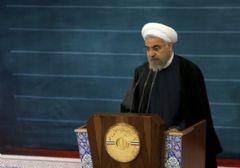UN Authority Figures
UN Permanent Forum on Indigenous Issues: Iran
 |
| Iranian authorities have escalated their persecution of minorities, including Baha'is, Christian converts, Sunni Muslims, Jews, and Zoroastrians, since the election of President Hassan Rouhani Source: The Washington Free Beacon, May 13, 2015 |
Mission of the Permanent Forum on Indigenous Issues: "The Permanent Forum is an advisory body to the Economic and Social Council established by resolution 2000/22 on 28 July 2000. The Forum has the mandate to discuss indigenous issues related to economic and social development, culture, the environment, education, health and human rights." (Permanent Forum on Indigenous Issues website)
Term of office: 2017-2020
Iran's Record on indigenous issues:
"[M]inorities did not enjoy equal rights, and the government consistently denied their right to use their languages in school. In addition, the Gozinesh (selection) law prohibits non-Shia ethnic minorities from fully participating in civic life. The law and its associated provisions make full access to employment, education, and other areas conditional on devotion to the Islamic republic and the tenets of Shia Islam... The government disproportionately targeted minority groups, including Kurds, Arabs, Azeris, and Baluchis, for arbitrary arrest, prolonged detention, and physical abuse (see also section 1.e.). These groups reported political and socioeconomic discrimination, particularly in their access to economic aid, business licenses, university admissions, permission to publish books, and housing and land rights. Human rights organizations, including the ICHRI and the IHRDC, observed that the government's application of the death penalty disproportionately affected ethnic minorities. In pretrial detention in Evin Prison, members of minority ethnicities and religions reportedly were repeatedly subjected to more severe physical punishment or torture than other prisoners, regardless of the type of crime accused...The government continued to use security law, media law, and other legislation to arrest and prosecute Kurds for exercising their rights to freedom of expression and association. The government reportedly banned Kurdish-language newspapers, journals, and books and punished publishers, journalists, and writers for opposing and criticizing government policies. Although speaking the Kurdish language was not prohibited, schools were prohibited from teaching it. Authorities suppressed legitimate activities of Kurdish NGOs by denying them registration permits or bringing security charges against persons working with such organizations. Kurds were not allowed to register most Kurdish names for their children in official registries. The Gozinesh law impaired the ability of Sunni Kurds to integrate into civic life... International human rights observers ... stated that the country's estimated two million Ahwazi Arabs faced continued oppression and discrimination. In January authorities executed two Ahwazi Arab cultural rights activists in secret without prior notice to their families... Ethnic Azeris, who numbered approximately 13 million persons or 16 percent of the population, ... reported the government discriminated against them by prohibiting the Azeri language in schools, harassing Azeri activists or organizers, and changing Azeri geographic names. Azeri groups also claimed a number of Azeri political prisoners had been jailed for advocating cultural and language rights for Azeris. The government charged several of them with 'revolting against the Islamic state.'... Local and international human rights groups alleged serious economic, legal, and cultural discrimination during the year against the predominantly Sunni ethnic Baluchi minority, estimated to be between 1.5 and two million persons. Areas with large Baluchi populations were severely underdeveloped and had limited access to education, employment, health care, and housing. The Gozinesh (selection) procedure limited Sunni Baluchis' employment opportunities and political participation and caused them to be underrepresented in government positions. Baluchi journalists and human rights activists faced arbitrary arrest, physical abuse, and unfair trials... The constitution allows the government to confiscate property acquired illicitly or in a manner not in conformity with Islamic law. The government appeared to target religious minorities in invoking this provision. There were several reports during the year of authorities evicting and seizing the property of members of the Bahai community without due process..."
(U.S. State Department's Country Report on Human Rights Practices 2014, Iran)
